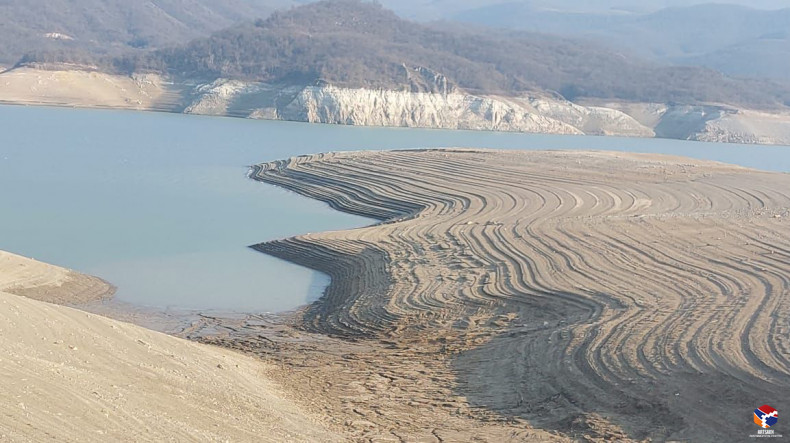
Sarsang Reservoir water levels dwindle, deepening energy crisis
Due to the obstacles caused by Azerbaijan, it has not been possible to restore the only high-voltage overhead line feeding Artsakh from Armenia for 102 days, the Artsakh government said in an update on Azerbaijan’s 131-day blockade of Artsakh.
Amid severe shortage of electricity, the Sarsang Reservoir is the only resource of electricity supply in Artsakh, and even in the case of a minor accident, the population of Artsakh is deprived of electricity supply for hours.
In addition, the volumes of domestic electricity production are much less than consumption, and the water levels of the Sarsang Reservoir are dwindling. Since January 10, the Artsakh Republic has switched to rolling blackouts.
The only pipeline supplying natural gas from Armenia to Artsakh remains blocked by Azerbaijan.
About 1,130 people have been deprived of the opportunity to receive necessary medical treatment due to suspension of planned surgeries in all medical facilities of Artsakh increasing by about 30 cases in the last 3 days.
337 patients have been transferred from Artsakh to Armenia to receive appropriate medical care with the mediation and accompaniment of the International Committee of the Red Cross to date. Due to the Red Cross not having an ambulance and only being able to transport patients with an ordinary vehicle, it is not possible to transport patients needing to lay down because Azerbaijan has obstructed the movement of Artsakh ambulances.
Around 3,900 people, including 570 children, have been separated from their homes as a result of the blockade, however, some have already returned home with the assistance of the Red Cross and Russian peacekeepers.
No citizen traveled freely along the Stepanakert-Goris highway, and the cases of two-way movement of people decreased by about 185 times, and only with the support of the Red Cross and RF peacekeepers (instead of 320,950 people in 131 days, 1,734 entry and exit in the last 3 days increasing by 29 cases).
Not a single vehicle of Artsakh citizens passed through the blocked road, and the movement of Red Cross and Russian peacekeepers vehicles was almost 50 times less than it should have been without the blockade (instead of 120,520, 2,421 vehicles entered and exited in 131 days, and that (only by Red Cross and Russian peacekeepers). That means only 27 vehicle entries and exits were recorded in the last 3 days.
About 12 times less vital goods were imported by the Red Cross and Russian peacekeepers than should have been without the blockade (4,247 tons instead of about 52,400 tons in 131 days, only 73 tons of which in the last 3 days).
During the blockade, Azerbaijan completely or partially interrupted the sole gas supply into Artsakh for a total of 65 days, and electricity supply has been completely disrupted for 102 days. This has led to daily blackouts and additional emergency shutdowns, resulting in many facilities closing or curtailing operations.
860 business entities (20,1 % of the total) have suspended their activities due to the impossible operating conditions under the blockade, while the remaining operate partially or with state support.
At estimated 10,300 people (including state-supported temporary work placements and more than 50% of private sector workers) have lost jobs and sources of income as a result of the impact on the economy from the blockade and disruptions of vital infrastructure
Construction work of 32.6 kilometers of roads, tens of kilometers of water lines, irrigation systems for thousands of hectares of land, 3,717 apartments, and more than 40 social and industrial infrastructures have been stopped.
During the blockade, the economy of the Republic of Artsakh suffered a loss of around $250 million, leading to decline of the predicted annual GDP index ($903 million) by more than 28 percent.
Newsfeed
Videos






























